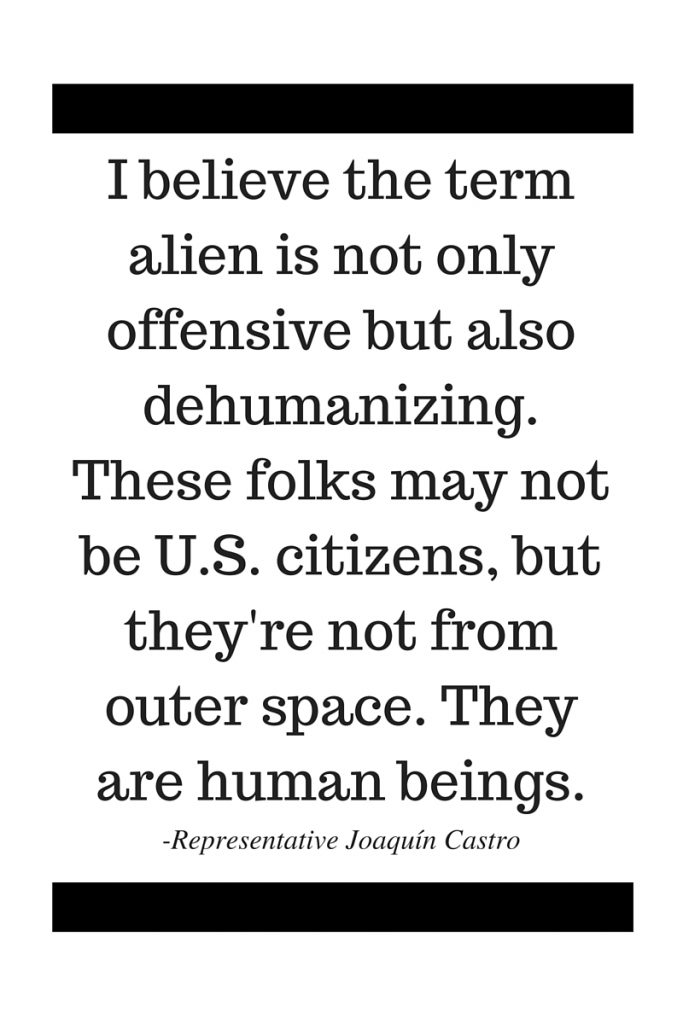Over the past several months, a quiet battle has been raging among librarians and politicians over the term “illegal alien.” For many years, immigrant rights activists have argued against using the term, which has taken on a decidedly pejorative meaning. Activists and legal experts note that while actions can be “illegal,” human beings cannot – to refer to them as such criminalizes existence itself.
While several news outlets have pledged to cease using the term “illegal alien,” there’s one place where the term still stands: the Library of Congress. But while subject headings don’t usually claim a lot of media attention or political interest, the Library of Congress has become a battleground for those who want to replace the term, and for those who won’t give it up. Here’s a timeline of the issue (for more detail, check out this excellent Library Journal piece):
2013
Dartmouth College student Melissa Padilla notices problematic search terms while researching a paper. Padilla and classmates bring the issue up with Dartmouth’s librarians, and discover that the search terms come from the Library of Congress and cannot be changed within Dartmouth’s libraries. Together, librarians and students work on a proposal asking the Library of Congress to replace the term “illegal alien” with “undocumented immigrant.” The proposal is submitted in summer 2014.
2015
After consulting with staff members, the Library of Congress releases a public memo stating that it will not change the wording because the phrase “Undocumented immigrant” is not directly synonymous with “Illegal alien.” Word spreads to members of the American Library Association, who decide to work through the system to try to push the change through.
January 2016
Various divisions and affiliates of the ALA, including the subject  analysis committee, social responsibilities roundtable, and REFORMA, formulate a resolution asking the Library of Congress to reconsider the original request. The resolution passes at the ALA midwinter meeting in January 2016.
analysis committee, social responsibilities roundtable, and REFORMA, formulate a resolution asking the Library of Congress to reconsider the original request. The resolution passes at the ALA midwinter meeting in January 2016.
March 2016
The Library of Congress announces that it will no longer use “illegal aliens” as a bibliographic term, saying that the once common phrase has become offensive. The library plans to use “noncitizens” in place of “aliens” and “unauthorized immigration” in place of “illegal immigration.”
April 2016
After learning of the change, conservative Republicans on the House Appropriations Committee introduce a provision calling for the term’s reinstatement, which is tied to a bill for Library of Congress funding. They argue that the term is legally accurate and should not be changed for the sake of political correctness.
June 2016
The House votes 237-170 to order the Library of Congress to continue using the term “illegal alien.” This is the first time in history that the House has interfered in the Library of Congress’ subject headings processes.
As a company that values diversity, this is an issue that we feel deeply invested in. Those of us who love books know well how powerful just one word can be. When that word is tied to our identity, it can not only define us but also define how others see us. It can make us feel safe, or endangered. It can make us feel proud, or ashamed. We believe that the term “illegal alien” is derogative and has no place in the Library of Congress. To see it politicized- and especially to see the power of decision taken away from expert librarians and placed in the hands of politicians- is disheartening and alarming.
Tomorrow, we’ll share a guest post with René Colato Laínez, author of Mamá the Alien/Mamá la extraterrestre about his own experience being called an “illegal alien” when he was young.
In the meantime, the Library of Congress has posted a survey where the public can share their thoughts on the proposed changes. If you would like to see the terminology changed, you can fill out this survey through July 20.


4 thoughts on “Diversity 102: The Library of Congress Battle Over “Illegal Alien””
Comments are closed.